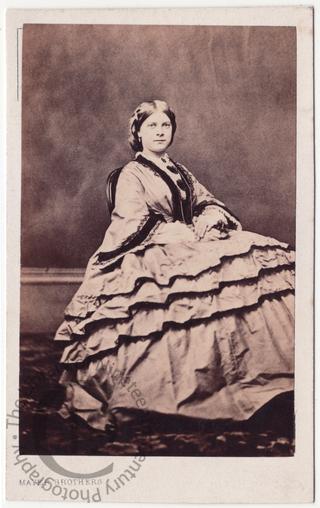
Agnes Willoughby (Mrs Windham)
The enquiry held in London in 1861 into the state of mind of William Frederick Windham, heir to the Felbrigg estate, was a mid-Victorian sensation that enthralled the British publics for months.
Windham inherited the Felbrigg estate, worth £4,000 a year, at the age of twenty-one, together with the prospect of other estates worth a further £12,000 when he should reach the age of twenty-eight. In the event that he died without issue, the estates were all entailed to his uncle, General Windham.
Young Windham immediately proceeded to run up enormous debts which had to be settled out of the property. Then he married Agnes Willoughby, a notorious courtesan, and made on her a preposterous settlement. His new wife had been the mistress of the tenor Antonio Giuligni – indeed, she soon returned to him - and another of her lovers, a timber merchant known as ‘Mahogany’ Roberts, had maintained her in a house on Piccadilly. Windham next arranged for a deed that barred the entail, preventing his uncle from succeeding to anything. However, if the General could prove his nephew was of unsound mind, then all – the marriage, the marriage settlement, the barred entail – would be null and void, so he instigated proceedings for the young Windham to appear before a Commission de Lunatico Inquirendo.
The subject was debated throughout England. At the outset, many held that young Windham’s conduct had been so odd that the enquiry had become a public duty. Others, however, pointed out that it was only since the marriage, and the likelihood of an heir, that the General had become concerned about his nephew’s state of mind, and that it was his intention to get him locked away in a madhouse so that his own sons might inherit the property one day.
Windham was certainly eccentric, to say the least. Obsessed with railways, he had befriended railway porters and engine drivers and, lavishly tipped, these ‘low’ associates allowed him to play with real trains. In London, he would dress up in policeman’s uniform and harass the prostitutes in Haymarket and the courtesans on Rotten Row. His obsession with Agnes Willoughby was all-consuming, even though she was flagrantly milking him for all he was worth, and had even installed her pimp, Roberts, at Felrigg Hall, where he was trying his best to dupe his host out of all the timber on the estate.
The enquiry opened on 16 December 1861. After numerous sittings, Windham was eventually judged ‘a man of sound mind,’ although his application for costs was rejected. For the privilege of having his deplorable private life exposed in the courts and before the British public for a month and a half, Windham was obliged to pay £20,000. His expensive pastimes unabated, he was eventually forced to declare bankruptcy and sell Felbrigg Hall. His behavior became more and more eccentric and he descended into penury. After a spell working as a driver on the Norwich to Cromer coach, he was reduced to lodging in a pot-house, living on an allowance of £1 a week from the General. By 1866, he had drunk himself to death. Although they had supported him at the time, the press wondered how ‘a British jury could have been led into the insane belief that Mr Windham possessed a sound mind.’
[The above is much-shortened version of a wonderful account of the extraordinary scandal entitled Mr and Mrs Windham. Written in 1951 by Donald MacAndrew, it is available in full on the Internet and makes for an extremely entertaining read.]
Photographed by the Mayer Brothers of London.
Code: 125631




